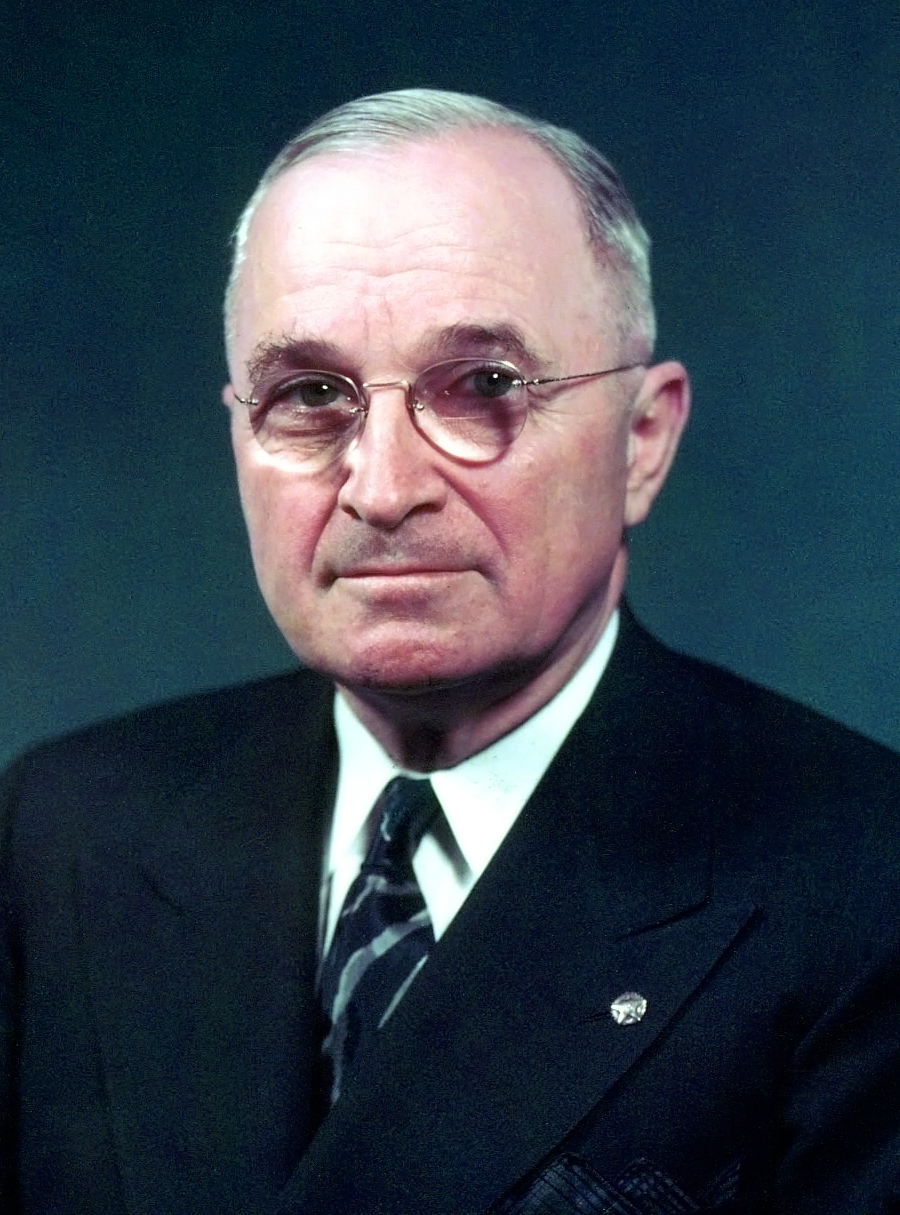More languages
More actions
(Loyalty oaths) Tag: Visual edit |
(Neocolonialism) Tag: Visual edit |
||
| Line 1: | Line 1: | ||
{{Infobox politician|name=Harry S. Truman|image_size=200|birth_date=May 8, 1884|birth_place=Lamar, [[Missouri]], [[United States of America|United States]]|death_date=December 26, 1972|death_place=Kansas City, Missouri, United States|nationality=Statesian|political_orientation=[[Anti-communism]]|political_party=[[Democratic Party (United States)|Democratic | {{Infobox politician|name=Harry S. Truman|image_size=200|birth_date=May 8, 1884|birth_place=Lamar, [[Missouri]], [[United States of America|United States]]|death_date=December 26, 1972|death_place=Kansas City, Missouri, United States|nationality=Statesian|political_orientation=[[Anti-communism]]<br>[[Imperialism]]|political_party=[[Democratic Party (United States)|Democratic]]|image=Harry Truman.png}} | ||
'''Harry S. Truman''' (May 8, 1884 – December 26, 1972) was the 33rd President of the [[United States of America]] from 1945 to 1953. His presidency is associated with the final stages of the [[Second World War]] and the early years of the [[Cold War]].<ref>[https://www.britannica.com/biography/Harry-S-Truman “Harry S. Truman | U.S. President & History | Britannica.”] ''Encyclopædia Britannica''.</ref> Notable events occurring under Truman's presidency are the [[atomic bombings of Hiroshima and Nagasaki]],<ref>[https://www.workers.org/2005/world/hiroshima-0811/ | '''Harry S. Truman''' (May 8, 1884 – December 26, 1972) was the 33rd President of the [[United States of America]] from 1945 to 1953. His presidency is associated with the final stages of the [[Second World War]] and the early years of the [[Cold War]].<ref>[https://www.britannica.com/biography/Harry-S-Truman “Harry S. Truman | U.S. President & History | Britannica.”] ''Encyclopædia Britannica''.</ref> Notable events occurring under Truman's presidency are the [[atomic bombings of Hiroshima and Nagasaki]],<ref>{{Web citation|author=John Catalinotto|newspaper=[[Workers World]]|title=Truman was a war criminal|date=2005-08-05|url=https://www.workers.org/2005/world/hiroshima-0811/|archive-url=https://web.archive.org/web/20230723212435/http://www.workers.org/2005/world/hiroshima-0811/|archive-date=2023-07-23}}</ref> the [[Marshall Plan]], the founding of [[North Atlantic Treaty Organization|NATO]], and the [[Korean War|invasion of Korea]]. Truman also created the [[Truman Doctrine]],<ref>[https://www.rt.com/news/years-since-truman-doctrine/ “60 Years since Truman Doctrine.”] [[RT (TV Network)|RT]] International. March 13, 2007. [https://web.archive.org/web/20220522235047/https://www.rt.com/news/years-since-truman-doctrine/ Archived] 2022-05-22.</ref> which represented a shift in U.S. foreign policy from a nominally isolationist policy to a more openly interventionist one, in which Truman argued that the United States was compelled to assist "free peoples" in their struggles against so-called "[[Totalitarianism|totalitarian]] regimes."<ref name=":0">[https://history.state.gov/milestones/1945-1952/truman-doctrine “Milestones: 1945–1952 - Office of the Historian.”] State.gov. [https://web.archive.org/web/20230326135104/https://history.state.gov/milestones/1945-1952/truman-doctrine Archived] 2023-03-06.</ref> In 1947, Truman issued an order requiring federal employees to take loyalty oaths.<ref name=":0233">{{Citation|author=Albert Szymanski|year=1984|title=Human Rights in the Soviet Union|chapter=The Land of the Free|page=180|pdf=https://cloudflare-ipfs.com/ipfs/bafykbzaceazdmtb2y3qq27fve5ib3gk7uv2unt6ae2xss74xmfpur7k5uhl5m?filename=Albert%20Szymanski%20-%20Human%20Rights%20in%20the%20Soviet%20Union_%20Including%20Comparisons%20with%20the%20U.S.A.-Zed%20Books%20Ltd.%20%281984%29.pdf|city=London|publisher=Zed Books Ltd|isbn=0862320186|lg=https://libgen.rs/book/index.php?md5=C597B1232D9EA6B0F3DCB438D7E15A81}}</ref> | ||
The Truman Doctrine was one of the guiding notions of the USA's [[United States imperialism|imperialist]], [[Anti-communism|anti-communist]] efforts at [[containment]] and rollback of the [[Union of Soviet Socialist Republics (1922–1991)|Soviet Union]] and other socialist nations and liberation movements throughout the Cold War.<ref name=":0" /> Instead of officially annexing former [[Empire of Japan (1868–1947)|Japanese]] [[Colonialism|colonies]] in the Pacific, he made them [[United Nations|UN]] trust territories similar to the mandates formed after the [[First World War]]. The [[United States Navy|Navy]] ruled the islands until 1951, when the Department of the Interior took over.<ref name=":022222">{{Citation|author=David Vine|year=2020|title=The United States of War|chapter=The Spoils of War|page=283–4|city=Oakland|publisher=University of California Press|isbn=9780520972070|lg=http://library.lol/main/191568BFAC73F009132DB00ECD0F0F05}}</ref> | |||
== References == | == References == | ||
<references /> | <references /> | ||
[[Category:Presidents of the United States]] | [[Category:Presidents of the United States]] | ||
Revision as of 20:53, 31 July 2023
Harry S. Truman | |
|---|---|
 | |
| Born | May 8, 1884 Lamar, Missouri, United States |
| Died | December 26, 1972 Kansas City, Missouri, United States |
| Nationality | Statesian |
| Political orientation | Anti-communism Imperialism |
| Political party | Democratic |
Harry S. Truman (May 8, 1884 – December 26, 1972) was the 33rd President of the United States of America from 1945 to 1953. His presidency is associated with the final stages of the Second World War and the early years of the Cold War.[1] Notable events occurring under Truman's presidency are the atomic bombings of Hiroshima and Nagasaki,[2] the Marshall Plan, the founding of NATO, and the invasion of Korea. Truman also created the Truman Doctrine,[3] which represented a shift in U.S. foreign policy from a nominally isolationist policy to a more openly interventionist one, in which Truman argued that the United States was compelled to assist "free peoples" in their struggles against so-called "totalitarian regimes."[4] In 1947, Truman issued an order requiring federal employees to take loyalty oaths.[5]
The Truman Doctrine was one of the guiding notions of the USA's imperialist, anti-communist efforts at containment and rollback of the Soviet Union and other socialist nations and liberation movements throughout the Cold War.[4] Instead of officially annexing former Japanese colonies in the Pacific, he made them UN trust territories similar to the mandates formed after the First World War. The Navy ruled the islands until 1951, when the Department of the Interior took over.[6]
References
- ↑ “Harry S. Truman | U.S. President & History | Britannica.” Encyclopædia Britannica.
- ↑ John Catalinotto (2005-08-05). "Truman was a war criminal" Workers World. Archived from the original on 2023-07-23.
- ↑ “60 Years since Truman Doctrine.” RT International. March 13, 2007. Archived 2022-05-22.
- ↑ 4.0 4.1 “Milestones: 1945–1952 - Office of the Historian.” State.gov. Archived 2023-03-06.
- ↑ Albert Szymanski (1984). Human Rights in the Soviet Union: 'The Land of the Free' (p. 180). [PDF] London: Zed Books Ltd. ISBN 0862320186 [LG]
- ↑ David Vine (2020). The United States of War: 'The Spoils of War' (pp. 283–4). Oakland: University of California Press. ISBN 9780520972070 [LG]
